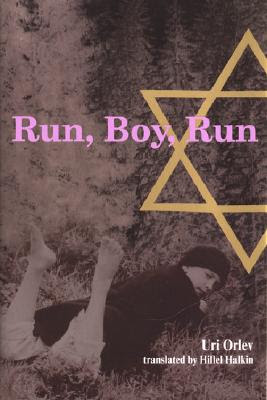Author: Uri Orlev
Illustrator: N/A
Translator: Hillel Halkin
Grade Level Equivalent: 5.8
Lexile Measure: 570L
Genre: Children's LiteratureSubgenre: Historical Fiction
Theme: Stay strong, even through the most difficult struggles.
Primary and Secondary Characters: Srulik/Jurek, Moishele, Yankel, Yoyneh, Shleymi, Avrum, Itsik, Yosele, the forester, Pani Nowek, Marisza, the pretty woman, Pan Wrubel, Pani Wrubel, Franek, Viktor, Zygmunt, Pan Wapielnik, German soldiers, Pani Herman, Werner, Marina, Grzegorz, Clara, Pan Boguta, Pani Boguta, Sasha, Pan Cherka, Pani Cherka, Christina, Pan Kowalski, Pani Kowalski, Pani Rappaport, Pani Staniak
Awards: American Library Association Notable Books for Children (Won, 2004)
Garden State Teen Book Award (Nominated, 2006)
Mildred L. Batchelder Award (Won, 2004)
Date of Publication: 2003
Publisher: Houghton Mifflin Harcourt
ISBN: 0618164650
Run Boy, Run follows a young Jewish boy, Srulik, as he escapes the Germans in the Holocaust era in Poland. Living in the Warsaw ghetto with his mother, father, sister and brother, they decide to cross the fence and escape into German occupied Poland where they could have food and try to blend in. Once over the border, the family is nearly caught by a couple of German soldiers. Srulik’s father escapes but he, his mother, and his brother are caught and sent back to the ghetto. One day, while digging for food in the dumpster with his mother, Srulik looks up to find that his mother has disappeared. He looks everywhere for her and eventually comes to the conclusion that she is gone and he is on his own. He is almost caught again by some German soldiers but is helped by a friendly farmer who helps him escape to the other side. Once there, he meets up with some other orphaned Jewish boys who show him the ropes and teach him to survive in the forest. They live together for a while until some men show up in the forest and the boys have to run away. They get separated and Srulik finds a village. He goes up to the door to ask for food. The woman lets him in and her husband offers him some work around the farm. However, when the man shows Srulik to the shed, he locks him in and leaves. The woman lets him out and tells him to run. It is then that he shows up on the doorstep of a kind woman who not only lets him in, but teaches him how to act like a Christian; how to pray, how to cross himself, how to act in front of others, and more importantly, Srulik changes his name to Jurek to throw people off of the fact that he is Jewish. Jurek bounces around from house to house, finding pseudo-families in several places. He never stays anywhere long as the threat of being revealed as a Jew and being turned over to the Gestapo is ever present. Eventually, a man and a woman on a wagon pick Jurek up off the road, tell him they are taking him to safety, but end up turning him in to the Germans. Once there, a German soldier cleans him up, locks him in a room and eventually takes him to live with and work for his sister. Weeks go by and through a series of terrible incidents, Jurek is back on the run and living in the forest. Another German solider comes across him but rather than turning him in, he decides to hide Jurek in his underground bunker. The two become friends, even playing checkers together, until the soldier has to go. Jurek is once again running through the villages, looking for work. When he sees the Germans planting mines on the bridge, he tells a farmer before he crosses, and the farmer tells Jurek that the Russians are coming and he should stay put to inform them. When the Russians arrive, they are so grateful for Jurek's help that they take him in. He stays with the Russians for a while and becomes a translator for them. But this, too, was shortlived as the Russians were heading to Berlin and the job became too dangerous for Jurek. He eventually makes his way to the Kowalski’s, who take him in and have him work for them. He stays with the Kowalski’s longer than expected until one day, he is picked up by some representatives of a Jewish Children’s Home. Reluctantly, Jurek goes to the home, only to escape back to the Kowalski’s and be picked up once more. The second time Jurek stays and is interviewed by a sweet, nice woman. This woman ends up taking Jurek back to Blonie, his original hometown, where Jurek learns the fate of his mother, brother, and sister, as well as his hometown. It is then that Jurek decides to stop running and stay with the Jewish Children’s Home.
This is an absolutely amazing story. It has you gripped from the beginning to the end. I think this book would be wonderful to have in a classroom setting—for older, more mature students—and would be a great book for them to read for a literature circle activity. I think it would have to be approved first, if it would even be allowed in a school setting at all because it does deal with some adult topics. A big part of the book is the fact that Jews are easily distinguishable by their circumcision and that plays a role in several scenes. Sex, although not mentioned directly, is insinuated in a few of the chapters, as well. Overall, though, the story is incredible and will stick with the students for quite some time. It is a heartbreaking account of a child living through one of the worst times in human history, and it will definitely provoke discussion with the students throughout the literature circles.

No comments:
Post a Comment